Google gets away with monopoly: Decoding the US ruling in Chrome sale and search-engine supremacy
 Sundar Pichai speaks at Google I/O 2025 | AFP
Sundar Pichai speaks at Google I/O 2025 | AFP
Google parent Alphabet Inc was more than rewarded in the latest US ruling. Yet, in classic ungrateful capitalistic fashion, the search engine major said it would appeal against the judge’s monopoly findings from 13 months ago that led to the recent ruling. Here is what happened.
The latest 226-page order by US District Judge Amit Mehta in Washington, D.C., more or less directed Google to disclose some of its search engine’s data and information from queries that the IT major used to help improve the quality of its search results to its current and would-be rivals.
But the judge rejected the US Department of Justice’s move to force Google to sell Chrome, stating that it would be risky. He also allowed the current deals to continue, which allowed Chrome to be the default browser on many devices out of the box.
The new ruling is disruptive in nature—Google will have to share part of its search data to rivals like DuckDuckGo and Bing to foster a healthier competition.
The worst-case scenario was the ruling forcing Google to divest Chrome and share all of its search data, which the firm avoided. But now, Alphabet said that it was worried about how the data sharing “will impact our users and their privacy, and were reviewing the decision closely.”
Back in October 2020, the DoJ slapped Google with a lawsuit alleging that it illegally monopolised the search engine and its related advertising markets.
The case, which began in the Trump-I administration, continued in Joe Biden’s administration. By 2023 September and November, Google defended its stand. Then, in May 2024, Judge Mehta heard the closing arguments.
In August 2024, Judge Mehta stated that Google violated the US antitrust law, and then in November, the DoJ came up with remedial measures, including selling Chrome, stopping paying Apple and other smartphone makers to make Google the default search engine, sharing data with its rivals, and stopping investing in other AI firms. A month later, Google pushed back, accusing the DoJ of intervening in the search engine market.
After the Trump-II administration takes over, the DoJ backed its remedial moves from November 2024 in March 2025. The case continued with hearings in April, May, and June. And finally, on Tuesday (September 3), Judge Mehta ruled that Google would not have to sell its Chrome browser. But the ruling barred the search giant from inking exclusive deals to prevent smartphone and other device manufacturers from offering rival products out of the box.
Despite the ruling going mostly in Google’s favour, like a true monopolist, the IT major announced its plans to appeal the judgment.
Business